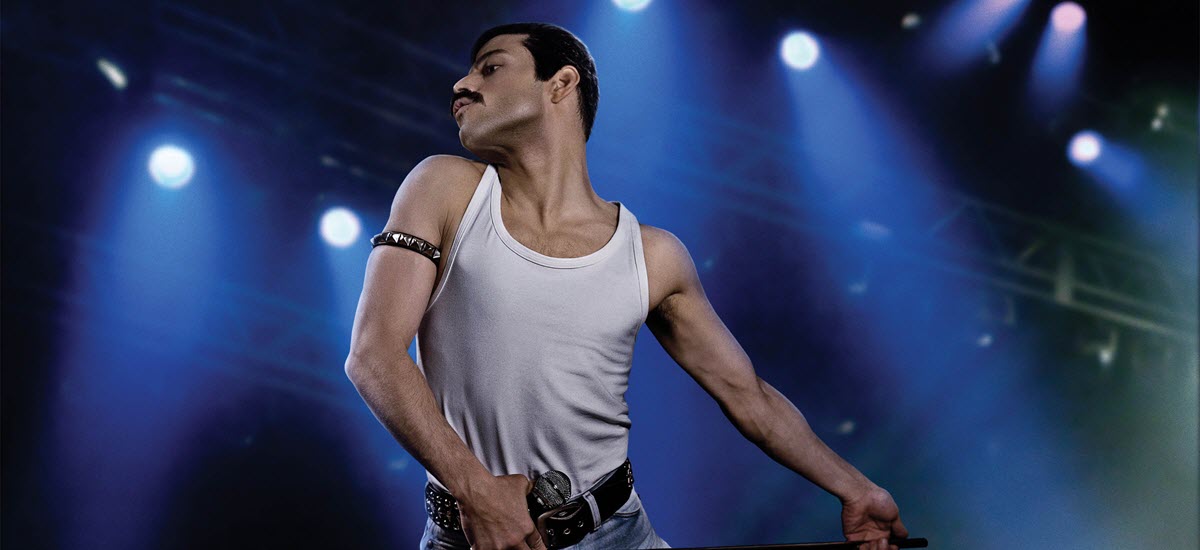Rami Malek is a revelation as Freddie Mercury in the Queen biopic, Bohemian Rhapsody, but don’t let that overshadow the rest of the movie going experience. The movie as a whole is an engrossing, entertaining rock epic that left the audience cheering at the end of the advance screening I attended last week. I didn’t know what I didn’t know about Queen and Freddie Mercury until I saw Bohemian Rhapsody
, and what I learned, I liked… a lot.
Of course, we don’t know how much of the story is fictionalized, but the character of Freddie Mercury is consistently sympathetic throughout the movie, which avoids turning him into a completely tortured soul. Yes, success sucks him into a predictable trap of alcohol, drugs, sex, and isolation, but it’s not his ultimate downfall. He rises from it for an amazing comeback, culminating in a recreation of the band’s appearance at the Live Aid concert in 1985.
Bohemian Rhapsody is quick to blame a villain for derailment of Freddie’s innocent desire to perform. He comes in the form of Paul Prenter (Allen Leech), an assistant to Queen’s manager, John Reid (Aidan Gillen), early in the band’s career. Prenter rises in power and is responsible for a despicable act that eliminates Reid from the picture so he can become the man in charge. He encourages Mercury to leave the band and go solo.
Does anyone remember Freddie Mercury solo? I sure don’t. That may tell you how well that idea goes over. At his lowest moment, Mercury realizes everything he’s lost and makes an honest, humbling plea to family, friends and the band to take him back. By then, though, while it’s not technically too late, we learn that he has contracted the AIDS virus. It would be too easy to say this happened during his dark times; it could have been any time.

This may be why trailers generated buzz that Bohemian Rhapsody avoided Mercury’s sexuality. It certainly does not; however, it’s not the focus. How and when he contracted AIDS is not important. The movie ends with Live Aid and an obligatory onscreen statement about his death. Except for brief glances, we don’t see the illness manifest. Again, I don’t know if this represents the real Mercury, but it contributes to the kind and gentle character depicted in the movie.
More interesting is Mercury’s own emergence as a gay man and his eventual self-acceptance. I believe he was conflicted about it. I believe he truly loved Mary Austin (Lucy Boynton), the young woman he meets in 1970 before the lead singer of a band called “Smile” quits, creating an opening for Mercury and the eventual genesis of Queen. Even though we know they won’t stay together, it remains important to him that she never remove his ring from her finger.
She is the best thing to ever happen to him. He knows that, temporarily loses sight of it, but never really forgets it. That she ultimately stood by his side is a testament to her character, which reflects back on the character of Mercury. Bohemian Rhapsody
makes the impression that everyone who encountered Mercury knew he was a musical genius and knew he was a good person. When success goes to his head just a little bit, they make allowances for him.

20th Century Fox
This may be a part of the movie that could be made clearer. There is talk about all the infighting among the band; however, all we see is some good-natured disagreements. The concept of Queen being a family is emphasized, but I never rolled my eyes once. That’s the kind of fighting we see: arguments among family members that we know truly love each other. They never seem to suffer from irreconcilable differences.
The screenplay by Anthony McCarten (The Theory of Everything, Darkest Hour) hits all the right notes, including some very funny ones. (Listen carefully to music producer Ray Foster, played by Mike Myers… yes, that Mike Myers…) The direction by Bryan Singer is stylish and visually pleasing. I don’t recall any incidental music; the soundtrack is composed entirely of music by Freddie Mercury and Queen.
It’s interesting to note that we don’t hear full songs at any point in the movie until the Live Aid finale. That’s a savvy decision, because you never really witness complete sequences that demonstrate the genius of Freddie Mercury. When we see almost the entire set from Live Aid, we’re hit with an emotional ton of bricks. We realize, wow, that’s what they’ve been talking about for two hours. This is why it all matters.
I’ll conclude by returning to a thought from my very first sentence. While the majority of praise for Bohemian Rhapsody is going to fall on the shoulders of Rami Malek, we must also recognize the performances of the actors portraying other members of Queen. Joseph Mazzello is John Deacon, Ben Hardy is Roger Taylor, and Gwilym Lee is Brian May. Like their real life counterparts, their roles may not seem to be as large as Mercury’s, but they’re just as important.


